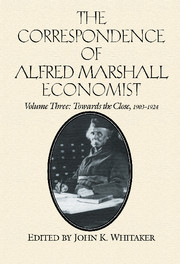Book contents
- Frontmatter
- Contents
- Introduction
- Abbreviations
- List of Manuscript Collections
- Biographical Register
- Chronology 1903-1924
- List of Letters Reproduced in Volume 3
- LETTERS 733–940
- LETTERS 941–1148
- Appendix I Reports of Marshall's Speeches to the Cambridge University Senate 1903–1908
- Appendix II Comprehensive Listing of Archival Sources for Volumes 1, 2, and 3
- Index of Letters by Correspondent
- Index of Persons
- Subject Index
LETTERS 941–1148
Published online by Cambridge University Press: 06 July 2010
- Frontmatter
- Contents
- Introduction
- Abbreviations
- List of Manuscript Collections
- Biographical Register
- Chronology 1903-1924
- List of Letters Reproduced in Volume 3
- LETTERS 733–940
- LETTERS 941–1148
- Appendix I Reports of Marshall's Speeches to the Cambridge University Senate 1903–1908
- Appendix II Comprehensive Listing of Archival Sources for Volumes 1, 2, and 3
- Index of Letters by Correspondent
- Index of Persons
- Subject Index
Summary
My dear Edgeworth,
About ten years ago I nearly completed a draft Book (No. X, I think) of my second volume ‘On Markets’. It had an introductory general chapter, followed by others in detail. After working some time, I found the task too long to be made complete. So I decided to select two or three typical instances, and work them out carefully. Wheat was—for many reasons—my chief instance. My draft copy on it is about 40 pp. long. I read several thousand semi-technical pages, chiefly American, on the subject: and came to the conclusions which I condensed in 1903 into §§ 23–27 and 29 of my Memorandum. The substance being that, after a special analysis, it appears to be not ‘extremely improbable’, but à priori to be expected, that the elasticity of supply of wheat in those parts of America from which most wheat has been raised in the past would obey wholly different laws from those which did prevail there a generation ago, and which now prevail in the Dakotas and Manitoba etc.: and that the evidence which could be got tended to prove à posteriori that this was the case.
Having had means of knowing that the information put before the British public from about 1902, as to the conditions of Northern Manitoba, Assiniboia, etc., was largely fraudulent, and prompted by unscrupulous ‘Americans’, who had taken options (and in some cases bought outright) a great deal of Canadian land, I began to read again on the same subject, and worked through ‘several thousand?’ pages more.
- Type
- Chapter
- Information
- The Correspondence of Alfred Marshall, Economist , pp. 221 - 397Publisher: Cambridge University PressPrint publication year: 1996



